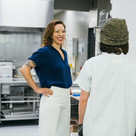Table of contents
Steve Jobs once said, “the secret of my success is that we have gone to exceptional lengths to hire the best people in the world.” Definitely words to live by as a business owner, even if you’re a one-location coffee shop.
Smart hiring is crucial. And as you grow, it becomes more and more important. With the right people in place, you’ll be able to scale. With the wrong people, you’ll get stuck in your tracks.
How do you find great employees?
But how do you find good employees? What are some best practices for hiring? The topic is a vast one, but here are some basics to get you started:
Define the role.
Before you even begin the hiring process, determine exactly what you’re looking for. First, write a list of the key tasks you need someone to tackle right away. Is it managing employee schedules or client appointments? Taking coffee orders? Coordinating events? Be as specific as possible about the type of help you need right now.
It also pays to be forward-looking here. Ideally, would you like the person in this role to eventually take on more? If so, outline exactly what you’d like them to start managing in the next three, six, nine, and twelve months. Maybe it’s help with opening your second location, or with expanding your services. A clear sense of what you want this person to do now and in the future is essential for assessing candidates.
Search in the right places.
Generally speaking, great people tend to know great people. So once you define the role you’re hiring for, ask your superstar employees if they know anyone who might be a good fit. Your staff already knows exactly what it’s like to work at your business, so they’ll be able to quickly assess who might work the best. Referrals will also save you a bunch of time, since there’s no need to bother with sifting through stacks of resumes. (There’s a reason why large companies often offer a “referral bonus” if one of their employees brings in a great candidate).
Write a clear job description.
If you don’t have luck with a referral, it’s time to hit the job boards. One word of caution here: anytime you post a job to a site like Craigslist or LinkedIn, you’re going to get flooded with resumes. A crystal-clear, detailed job description will help cut down on this by (hopefully) weeding out the people who aren’t qualified.
As you write your job description, refer back to all that initial legwork you did in defining the role. First, look at everything you jotted down that you need someone to take care of right away. Then use that to inform your minimum qualifications/skills section. If it’s making drinks, you might note proficiency on an espresso machine as a criteria. If it’s scheduling clients, maybe it’s experience with appointments software.
You’ll always have to train people on some aspects of the job, but make sure to specifically call out the areas where you’ll need people to hit the ground running. You can also add an “ideal candidate” section to your job posting. This is where you can list all of the qualities that a person would need in order to expand the role. If you’d like this new employee to eventually take on some marketing tasks, maybe note that a degree in communications or a general social media savviness would be a nice-to-have. The SBA has a handy section on writing job descriptions that’s worth taking a look at.
Ask the right interview questions.
Best practices in interviewing candidates deserves it’s own article (read our primer on interview questions). But suffice it to say that asking the right questions in an interview is really important. Yes, you’ll want to go through their work history to make sure they’re qualified.
But you’ll also want to ask some “softer” questions that get to the heart of how they’d interact with the rest of your staff and your customers. How do they approach problem solving? What’s a specific example of how they’ve solved a work problem in the past? How good are they under pressure? If a client is dissatisfied or angry, how would they handle that situation?
Bring in more opinions.
It’s always a good idea to get at least a couple of people to interview a candidate. Each person who works at your company will be approaching the interview from a different perspective, so having multiple heads in the game will help to balance out the overall assessment.
Some larger companies do something called “interview panels,” where each person is tasked with focusing on a certain area in their interview with a candidate. Maybe one person focuses on teamwork, for example, while another focuses on the more technical skills of the job. An added benefit of this approach is that it makes your current employees feel like they are part of the decision making process. After all, they’re the ones who will eventually be working with this person.
Again, solid hiring decisions are key to the success of any business. And when you bring on good people, running your business will become even more fun.
![]()











